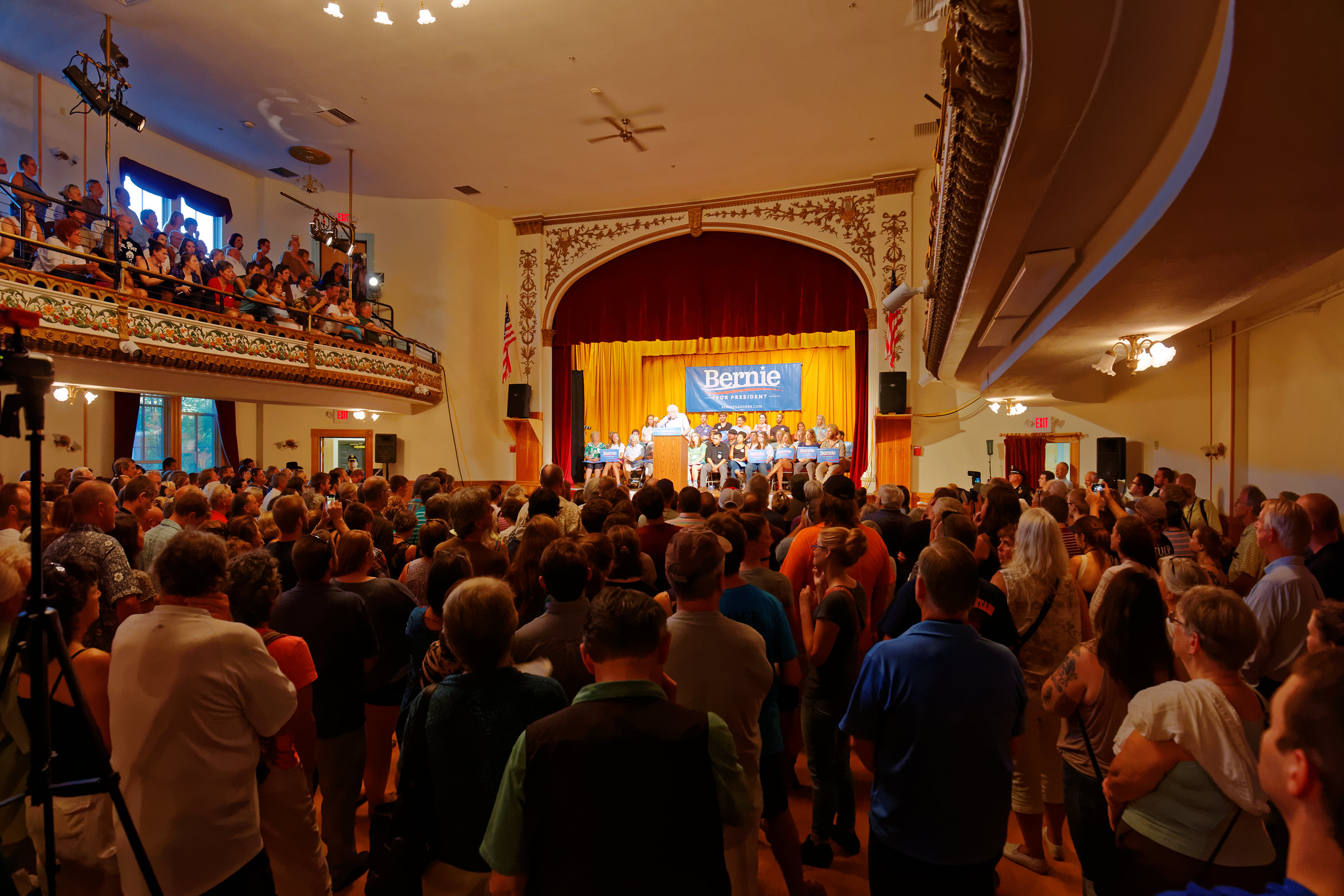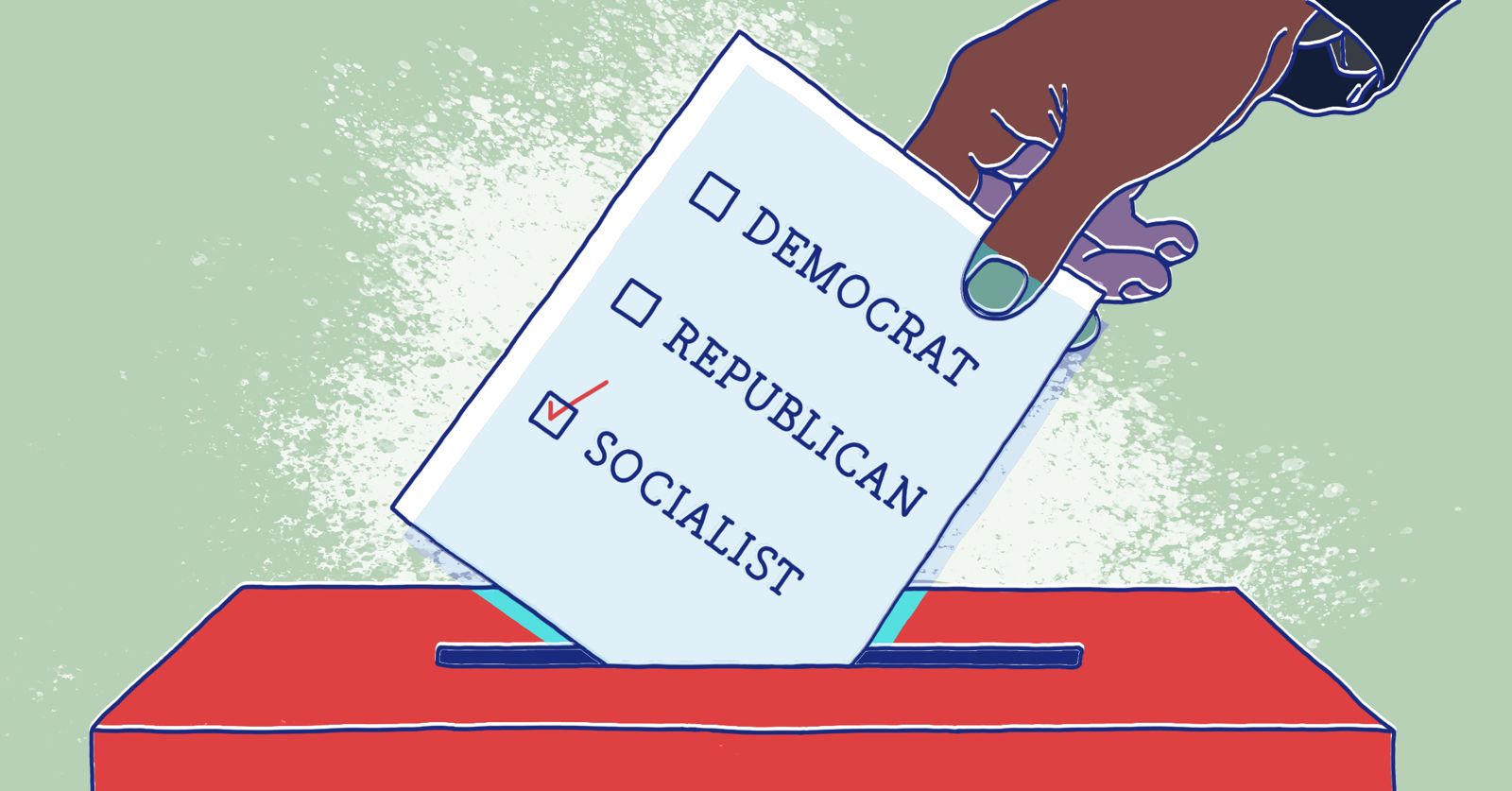If you like this piece, read more about where we stand and sign up to get our occasional email bulletins!
On Sunday, December 9, the East Bay chapter of DSA will debate a resolution on organizing around a likely Bernie Sanders presidential campaign. East Bay DSA member Robbie Nelson lays out the case in favor, an argument we believe applies to chapters across the country.
When we in DSA talk about how to relate to electoral campaigns in general — and Bernie Sanders’s potential 2020 presidential campaign in particular — it is tempting to simply assess individual candidates in terms of their public statements, their policy positions, and how those align with the political ideals of our organization.
While these questions are obviously relevant to our political decision-making, socialists should also evaluate the broader political terrain and social forces at play. We should ask how a given campaign fits into that terrain, and how we can most productively intervene in order to advance our political agenda.
The first two questions we should consider when weighing a potential campaign are: Will the campaign in question advance a class-struggle perspective within our broader political context? And will it help us build the type of mass, working-class movement that we will need to take on the capitalist class in a meaningful way?
In regards to an independent DSA campaign for Bernie Sanders, the answer to both of those questions is a resounding “yes.”
It seems more and more certain that Bernie Sanders will run for president, with or without a strong campaign run by DSA. While the growth of DSA into a membership organization of more than 55,000 people is an impressive feat, we have a very limited ability to shape the American political landscape on our own. That’s not to say we can’t play a meaningful role within the Sanders coalition, but our primary task as a small-but-growing socialist movement is to figure out how we can most productively relate to the broader currents in American politics — especially one like Sanders’s that will activate a big working-class base.
If we want to run a strategic and independent DSA for Bernie campaign, it is important that we start preparing now. By doing so, we will be able to have serious deliberations about our strategy and bolster our ability to hit the ground running on our own terms when Sanders does announce his candidacy.
Socialists must be willing to criticize Sanders if he makes a bad decision on a Senate vote or makes a public statement that we seriously disagree with. But a DSA endorsement would not be a rubber stamp. Rather, we should run an independent campaign that taps into dynamics of class politics and the potential for mass politicization that a Sanders presidential run will spark.
Advancing Class Politics
The heart of a socialist analysis is the insistence on the inherent conflict between the working class and the capitalist class. The reason that we, the working-class majority, can’t live materially abundant and socially rich lives is because the capitalist class exploits us at the workplace, extorts us for basic needs like healthcare and education, and has a controlling influence over our supposedly democratic governments.
Sanders’s insistence on a class-conflict narrative is what really distinguishes him from run-of-the-mill “progressive” Democrats. He is willing to name a class enemy — “the millionaire and billionaire class” — and articulate a politics based on the conflict between that class and the working-class majority. Our healthcare system is unjust because there are companies that profit from it. Jeff Bezos is absurdly rich because Amazon workers earn poverty wages.
And it’s not just Sanders’s political narrative that advances class struggle, it’s the concrete platform he runs on. Medicare for All, free public college, a $15 minimum wage, and a Green New Deal would represent the largest redistribution of wealth and power from America’s capitalist class to its working class in generations. Bernie Sanders’s political platform is anchored in the politics of decommodification — of removing large sections of the economy from the for-profit marketplace.
These structural reforms, like Medicare for All, would concretely empower working people to advance struggle even further. Unions would no longer have to bargain over complex and often concessionary healthcare provisions in their contracts, which would open space for more aggressive stances on wages, working conditions, and democracy on the job. People in abusive work or home relationships would have an increased ability to leave such situations knowing that their health care is not dependent on remaining in that abusive job or relationship. Students would not face crushing debt that constrains their life decisions. And the capitalist class would be denied avenues for profit in major sectors of the economy.
In both political rhetoric and concrete platform, a Bernie Sanders presidential run offers the best opportunity in several generations to bring a class-struggle message to tens of millions of people and drive it straight into the heart of American politics. It has the potential to reshape this country’s political landscape — both within the state and among grassroots movements.
Building a Mass Movement
Almost all socialists agree that to seriously challenge the capitalist class, we need a mass movement. But if that’s the case, we should seriously think about what that means.
Just to put things into perspective, DSA has a membership of about 55,000 in a nation of 325 million. At its peak in 1944, the Communist Party USA had about 80,000 members in a nation of 138 million. The Corbyn-era UK Labour Party has swelled to more than 540,000 members in a nation of 66 million. Of course, membership numbers do not simply equal social power, and there is no “magic membership number” that will automatically result in political success.
But these figures help illustrate an important point: if we want to be part of a viable project to effect a socialist transformation of our society, the organized socialist movement in this country will need to be hundreds-of-thousands or even millions of members strong. And those organized socialists will need to be embedded in even larger movements of working people fighting for our class interests — for strong and democratic labor unions as well as for issues like healthcare, the environment, housing, and education.
With the urgency of impending climate change, the ongoing decline in working-class living standards, and the rise of right-wing nationalism, socialists need to figure out how to “massify” our movements — and fast.
Bernie Sanders’s presidential run will spark a wave of mass politicization, particularly among young people as well as working-class people of color. Millions of working people will be following Bernie’s message on social media, talking politics with their families and co-workers, attending rallies, and learning how to organize for the first time. This will happen no matter what DSA chooses to do.
So the question is, how should DSA relate to this important political phenomenon? The answer is clear: We join the millions of people being politicized for their own class interests and organize enthusiastically for Sanders’s working-class campaign platform.
In doing so, we can persuasively offer the message to millions of Sanders supporters that the best way to really carry forward a political revolution is to become active in socialist organizations, unions, and grassroots-led social movements. And far from hampering our work outside elections, a DSA for Bernie campaign would be the best mechanism available for channeling the political energy generated by Bernie into a bigger and more vibrant working-class movement.
There are serious and persuasive socialist arguments about the contradictions and limitations of electoral politics and the Democratic party in particular. I share those criticisms, and we shouldn’t be shy about talking about them. But abstaining from this campaign won’t actually help us to overcome such contradictions — quite the opposite. In reality, participating in Sanders’s campaign will allow us to better highlight the bankruptcy of the Democratic party establishment on a national stage, and to point out the need for radical change. This is what happened during Bernie’s last primary campaign against Hillary Clinton, and there is no reason to think something similar won’t happen again in the primary leading up to 2020.
We can’t simply stand aloof from a popular wave of class-struggle politics and then expect hundreds of thousands of working people to flock to our banner. We can only help organize the social base of an independent working-class movement through shared struggle. By running a principled, enthusiastic, and independent campaign for Bernie — emphasizing class conflict and his platform of redistribution and decommodification — we can help turn this exciting political moment into a durable mass movement.




